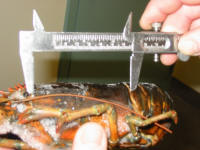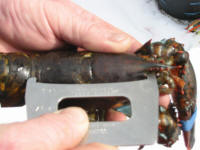|
'Short Lobster' crime in Nova Scotia
Debbie MacKenzie
March 12, 2008
An open letter to lobster fishermen from Debbie
MacKenzie (not a lawyer) regarding my concern that some of you may have
been dealt short by the justice system, and suggesting a possible remedy.
This is not legal advice, but merely the opinion of a non-lawyer who lost
a trial trying to do the apparently impossible, defend a Nova Scotia
fisherman charged with "possession" of "short" lobsters by the Department
of Fisheries and Oceans (DFO).
Canada's Fisheries Act grants absolute discretion to DFO fishery
officers to determine fishermen's "strict liability" for the "possession"
of "short" or "undersize" lobsters. Courts are imposing large fines. When
fishery officers determine that a lobster is "short" and/or that the
number of "short" lobsters found in a batch shall be deemed an offence,
they are currently under no obligation to grant the fisherman the legal
protections enjoyed by other citizens under the Weights and Measures
Act. I want this changed, as I have had friends hurt by this
injustice. Can the Fisheries Act withstand a challenge under the
Canadian Charter of Rights and Freedoms that holding fishermen to
strict liability in measurement constitutes a breach of their equality
rights as citizens?
|

(click on photo to enlarge)
This is a frozen
exhibit, that was entered at my friend's trial as evidence a
lobster was "short." This photo was taken one week before trial,
when the allegedly "short" lobster was compared to a vernier
caliper, an adjustable measuring device, that was set at 82.5mm. The
capacity of the caliper to measure accurately is at best +/- 0.1mm.
No matter what tool is used, measurement can never be known with
perfect accuracy. The length of an object can only be determined
within the limits of error of the measuring device. DFO fishery
officers are not trained to use vernier calipers, nor to determine
the actual length of any lobster they believe is "short." They make
this decision using nothing but the same size grading measures used
by the fishermen. As in the photo below, the lobster grading
"measure" is marked 82.5mm and sold by traders such as Vernon D'Eon.
What would happen if a fisherman incurred a "short" lobster fine and
then tried to complain that it was D'Eon's fault because he sold a
lobster measure that was a wee smidge too small? D'Eon's defense would
be found in the Weights and Measures Act. Why can a lobster
fishermen not also use this law as his defense of small human error
plus inherent uncertainty in measurement?
Obviously, he should be
able to, as lobster fishermen are entitled to equal protection under
the law in a free and democratic society. Therefore, I believe a
"Charter" challenge is in order.

(click to enlarge)
A lobster grading
"measure" applied to a live lobster. While they have the right to be
set free unharmed if the 'carapace' shell is found to be smaller
than 82.5mm in length, Her Majesty's lobsters do not always
cooperate with the size screening procedure that can save their
lives. The silly bugger in this photo vigorously flapped its tail
rather than hold still. Many others likewise resist, even when they
find themselves on a moving boat in the dark, exposed to winter
weather and being handled by a fisherman with cold hands wearing
bulky gloves. Her Majesty obliges a fisherman to provide this
screening service to her ignorant lobsters who choose to place
themselves in his possession. I think Her Majesty should then owe
the fisherman the normal protection that has been available to other
innocent humans for over a century under the Weights and Measures
Act. Under this law citizens are protected against prosecution
based on trivial degrees of error in measurement. |
Elements of the "short lobster" offence that the Crown must
establish:
"Possession" - how is this established? Easily.
"under 82.5 mm in length" - how is this established? Currently, this is
established on the basis of the opinion of fishery officers who
(1) have been given no training in making accurate measurements of length,
(2) who are not required to record the lengths of lobsters, and
(3) who have the discretion to grant zero leeway to fishermen while
failing to understand the limited accuracy of the lobster grading measure.
Possible defenses allowed under the Fisheries Act:
"due diligence" - essentially ruled out by caselaw in Nova Scotia
(currently)
"reasonable and honest belief" - essentially ruled out by caselaw in Nova
Scotia
2006: My unsuccessful attempt to challenge the accuracy of
measurement by fisheries officers after a friend was charged with
possession of "short" lobsters.
Trial evidence from qualified expert at Measurement
Canada (lobster grading "measures" used by DFO are "adequate" for use in
"trade")
Trial evidence about the size of allegedly "short" lobsters from DFO
fishery officers (it must be "a snug fit" or a lobster is "illegal," and
possession of even one of these constitutes a "strict liability" offence)
Statement of defense from my friend ("I am human.")
Opinion of the judge (no authority to question the discretion of the
fisheries officers)
Applying the Weights and Measures Act as a defense under the
Fisheries Act - how much leeway would this law give fishermen as
protection against trivial short lobster charges arising from honest human
error? Is it reasonable?
The way I read the Weights and Measures Regulations, this law
would allow fishermen to be in limited possession of lobsters that are
less than 82.5mm in length. If this legal protection was extended to
fishermen, individual lobsters could be "short" by either 2% of the stated
length, or by 0.4mm, depending on the interpretation chosen to classify
the measuring "device" and for considering lobsters a "commodity." Under
the Weights and Measures Act, this is called "the prescribed limit
of error." In either case, lobsters could fail to meet the "snug fit" test
currently applied by fishery officers while fishermen continued to meet
compliance requirements under the Weights and Measures Act. Beyond
that, a small percentage of lobsters could be a bit shorter than the
prescribed limit of error, as long as they were not over twice the
prescribed limit of error. By my interpretation of this section, 7 or 8%
of the catch could be found to be up to 4% shorter than 82.5mm and the
fishermen would still be within compliance requirements under the law and
immune from prosecution. I find this to be reasonable. I believe that if
this law had been applied, my friend would have been acquitted of the
"short lobster" charge. As it was, he had less than 1% "illegal" lobsters
scattered throughout his holding crates as determined by the opinion of
fisheries officers. For this my friend was
found guilty and punished with a huge fine and a 4 day license suspension
at the beginning of the season. At the trial, I tried to show that the
fishery officers did not meet the Crown's burden of proof because they did
not understand the science of measurement, and I tried to show that their
"short lobster" allegations were therefore unreasonable. However, I failed
to make the point. At the time, I did not think to present this argument
to the court as a challenge of strict liability in measurement under the
Fisheries Act as unconstitutional. However, if I had it to do over
again, that is what I would do.
What is "strict liability?" What is that designation of offence
intended for?
Essentially, strict liability is imposed for offences that pose grave
threats to society, such as drunk driving and possession of heroin. It is
rather over the top for the justice system to apply the same standard to
possession of extremely few and marginally "short" lobsters.
Does DFO mistakenly assume that the word "adequate," as used by a
trained Measurement Canada expert, somehow confers flawless
"accuracy" in "measurement" by fisheries officers? ...Have their lawyers
not read the Weights and Measures Act? This is one of Canada's
oldest laws, in which Parliament laid out what is considered "due
diligence" in measurement. Why has this never been applied to fishermen,
as should be their right?
The Constitutional challenge, to the enforcement
under the Fisheries Act of "strict liability" to undersize lobster
possession, should be made under section 15 of the Canadian Charter of
Rights and Freedoms, which guarantees "equality rights":
"15.
(1) Every individual is equal before and under the law and has the right
to the equal protection and equal benefit of the law...'
All the best,
Debbie MacKenzie
email:
Codmother@bellaliant.net
(Disclaimer: Again, I am not a lawyer and this information is not to be
taken as legal advice.)
At trial, the fishery officers testified that they gave my friend
something they believed to be "the benefit of the doubt." They explained
that their only point of "doubt" was whether or not their lobster grading
measure, if hooked into the back of the eye socket, cleared the back edge
of the shell with "no resistance." The fishery officers' "doubt" was
focused on whether or not they personally could feel any resistance, i.e.
did it feel "snug." If this is the standard applied, fishermen can be
fined for errors made by fishery officers. Rather than giving my friend
this vague alleged benefit, of the fishery officers' "doubt" regarding
their perception of friction, the Courts should instead give him and other fishermen the benefit of protection under the
Weights and Measures Act.
Links:
Photographic evidence used by DFO
Canadian Charter of Rights and Freedoms
Weights and Measures Act
Weights and Measures Regulations
Measurement Canada Federal Government Department with the motto
"Fair Measure for All"
R v. Croft Nova Scotia case law establishing that duly diligent
fishermen cannot successfully plead "due diligence"
October 2007: Nova Scotia Court of Appeal upheld my friend's conviction
and sentence (but at no level did the Nova Scotia courts consider the
possible application of the Weights and Measures Act in his
defense.)

|


